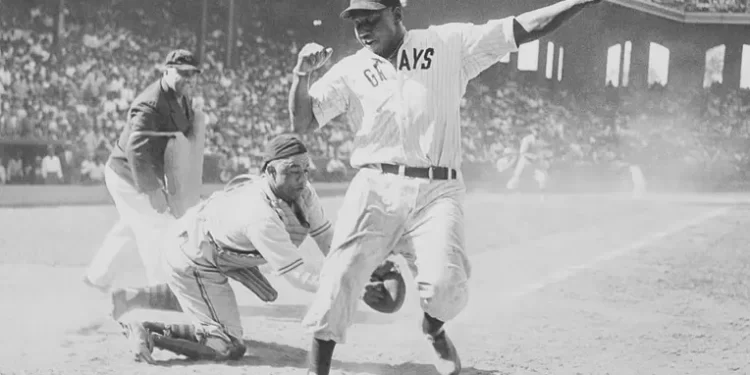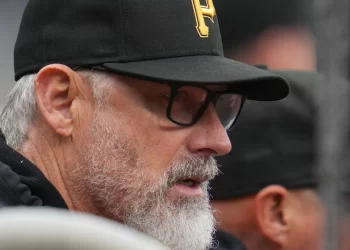By: Zachary Draves
Baseball has generally been looked at as slow to keep up. Both in terms of the play itself and in keeping with societal change. But as it has been said before, a broken clock is right every once in a while.
Last Tuesday, MLB made it official that the records of the Negro Leagues will be counted as official major league records. These include the accomplishments of 2,300 Negro League players from 1920 to 1948, which is roughly 75% of the available records.
In an official statement, MLB said in part:
“Today’s announcement is the first major step that makes the achievements of the players of the Negro Leagues available to fans via the official historical record. The move will prompt huge changes in the record book.”
The Negro Leagues, which were established in 1920, were a professional league made up of entirely African American players, managers, coaches, and owners. At the time, MLB operated under a color line in which African Americans were forbidden from playing.
Not only were the Negro Leagues a catalyst for some of the greatest talent in the game’s history, they also engineered black economic empowerment and social mobility at a time when segregation was the law of the land.

(Courtesy: Matty Zimmerman/AP)
After Jackie Robinson broke the color line in 1947, MLB began to integrate and eventually, the Negro Leagues dissolved.
The most notable players in the Negro Leagues included, but are not limited to, Robinson for the Kansas City Monarchs, Satchel Paige for the Chattanooga Black Lookouts, Hank Aaron for the Indianapolis Clowns, Willie Mays for the Birmingham Black Barons, Ernie Banks for the Kansas City Monarchs, and Josh Gibson for the Homestead Grays.

(Courtesy: Negro Leagues Baseball Museum Inc.)
Due to the additions made to the record books, Gibson now has the highest single-season batting average of .466 in 1943 and the highest career batting average of .372.
This effort to recognize these statistical achievements has been years in the making and was amplified after the summer of 2020 when America was in the midst of a racial reckoning following the murder of George Floyd.
That year, MLB announced that they would begin the process of adding the Negro Leagues to the official records with the help of a 15-person Negro Leagues Statistical Review Committee composed of historians, statisticians, and baseball journalists.
The goal of the committee was to systemize standards in order to verify and legitimize official records.

(Courtesy: Mark Rucker/Transcendental Graphics, Getty Images)
Since 2020, the supposed “racial reckoning” has resulted in many ways of progress being squashed with various states enforcing strict limitations if not outright banishment on the teaching of black history.
But this decision by MLB is a major victory over such intentional historic amnesia and will at the very least increase people’s curiosity about the Negro Leagues.
“I think that it is important that we recognize the Negro leagues, said Dr. Louis Moore, Professor of History at Grand Valley State University in a phone interview with Team NBS Media. “I hope the players get mainstream attention. It was always a great league and it didn’t need the stamp of white approval.”
This is not only a pushback against current forces attempting to negate history, but it is also a case of catchup.
The greatness of the players in the Negro Leagues was there in real time and African Americans always knew of the talent and broader social impact it had. It is just now, like with many other cases of black history long forgotten, that others beginning to take notice.
“It was always there, ” said Dr. Moore. “Part of the problem with history is who we get to say what’s history. It only becomes history and important when this white power structure labels it as such. These guys had agency. You don’t really need Major League Baseball to say that it is legitimate. It is fine that they recognize it, but it is a lot of power for MLB to come in and say now all of a sudden Josh Gibson is legit.”
Years of neglect have been vanquished in the form of statistical recognition, but it is going to take a lot more for MLB to strengthen its commitment.
According to The Institute for Diversity and Ethics in Sports at the University of Central Florida, African Americans made up 6.2% of MLB players on opening day rosters in 2023, a decline from 7.7% in 2022, even with some signs of improvement.
The Institute found that the highest percentage of black MLB players was at 18% in 1991.
For a league that annually honors Jackie Robinson on April 15th, these present numbers would make him and others roll over in their graves.
“It has been years of neglect, ” said Dr. Moore. “Hopefully it is not just recognizing you, but how are we going to build off it. It is going to take a lot of money to rebuild what they destroyed.”
It is going to take a lot of work to increase the presence of black players in the game, but no matter the current metrics or the nefarious attempts at erasing truth, the accomplishments of the Negro Leaguers are forever in print.
It may have been past time for the national pastime, but it comes at the right time.


 NFL
NFL





